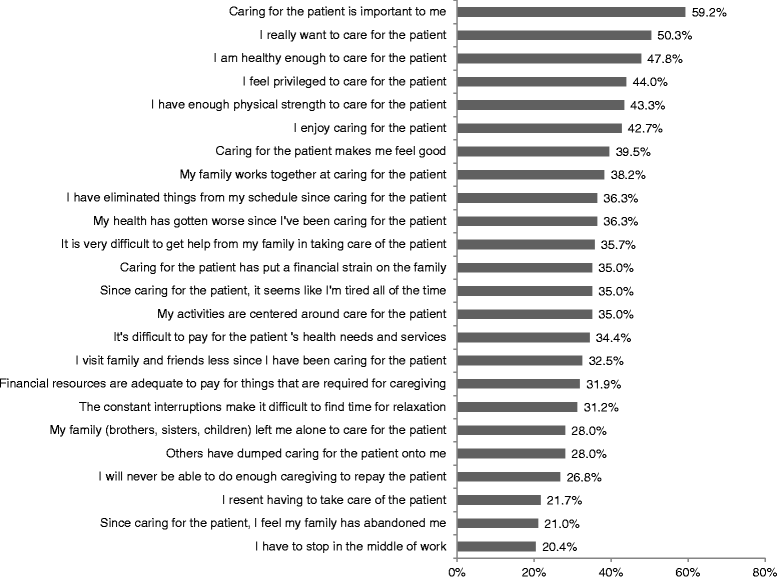Assessing health status in informal schizophrenia caregivers compared with health status in non-caregivers and caregivers of other conditions
- PMID: 26194890
- PMCID: PMC4509463
- DOI: 10.1186/s12888-015-0547-1
Assessing health status in informal schizophrenia caregivers compared with health status in non-caregivers and caregivers of other conditions
Abstract
Background: Research indicates schizophrenia is a cause of burden for patients and caregivers. This study examined health-related quality of life (HRQoL) and comorbidities experienced by informal schizophrenia caregivers compared with non-caregivers and caregivers of adults with other conditions (e.g., Alzheimer's disease, cancer, and stroke).
Methods: Data were obtained from the 5EU (France, Germany, Italy, Spain, UK) National Health and Wellness Survey, an online questionnaire that is representative of the total 5EU adult (18+ years) population. Respondents provided information on HRQoL (SF-36v2: mental and physical component summary (MCS, PCS) and SF-6D (health utility) scores), items from the Caregiver Reaction Assessment (strongly disagree to strongly agree) and comorbidities (sleep difficulties, insomnia, pain, headaches, heartburn, anxiety, depression) experienced in the past 12 months. Schizophrenia caregivers (n = 398) were matched to non-caregivers (n = 158,989) and caregivers of other conditions (n = 14,341) on baseline characteristics via propensity scores. Chi-square tests and ANOVAs were used to determine significant differences across groups.
Results: The average age of schizophrenia caregivers was 45.3 years (SD = 15.8), and 59.6% were female. After matching, schizophrenia caregivers reported lower MCS (40.3 vs. 45.9), PCS (46.8 vs. 49.0), and health utilities (0.64 vs. 0.71) compared with non-caregivers (all p < 0.001). Schizophrenia caregivers were more likely to experience sleep difficulties (42.7% vs. 28.5%), insomnia (32.4% vs. 18.5%), pain (39.7% vs. 30.4%), headaches (48.0% vs. 42.0%), heartburn (31.7% vs. 22.9%), anxiety (37.9% vs. 23.6%), and depression (29.4% vs. 19.4%) than non-caregivers. Comparing schizophrenia caregivers and other caregivers, schizophrenia caregivers reported lower MCS (40.3 vs. 42.7, p < 0.001), and health utilities (0.64 vs. 0.67, p < 0.001). Schizophrenia caregivers were more likely to experience sleep difficulties, insomnia, pain, and anxiety than other caregivers. Almost 60% of schizophrenia caregivers agree/strongly agree that caring for the patient is important to them, but only 31.9% agree/strongly agree that they have the financial resources to provide adequate care.
Conclusions: Schizophrenia caregivers reported worse HRQoL than non-caregivers and caregivers of other conditions. Providing care for an adult relative with schizophrenia is important to caregivers, but caregivers need more resources to provide adequate care. Providing informal schizophrenia caregivers with support services to help better manage patients may improve their health status.
Figures
References
-
- Ochoa S, Vilaplana M, Haro JM, Villalta-Gil V, Martinez F, Negredo MC, Casacuberta P, Paniego E, Usall J, Dolz M, et al. Do needs, symptoms or disability of outpatients with schizophrenia influence family burden? Soc Psychiatry Psychiatr Epidemiol. 2008;43(8):612–618. doi: 10.1007/s00127-008-0337-x. - DOI - PubMed
-
- Aranda-Reneo I, Oliva-Moreno J, Vilaplana-Prieto C, Hidalgo-Vega A, Gonzalez-Dominguez A. Informal care of patients with schizophrenia. J Ment Health Policy Econ. 2013;16(3):99–108. - PubMed
Publication types
MeSH terms
LinkOut - more resources
Full Text Sources
Other Literature Sources
Medical
Miscellaneous


